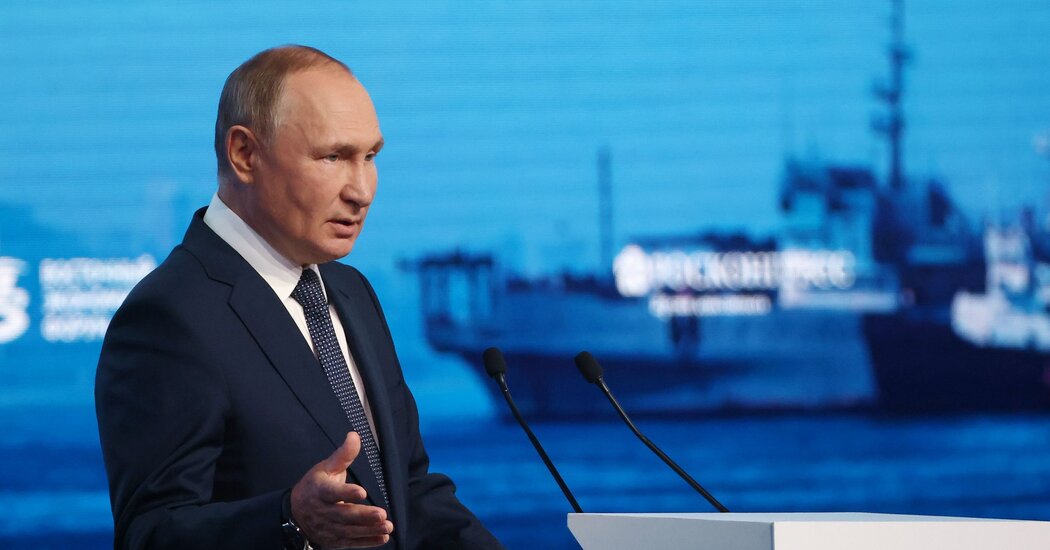Putin Says Russia Has Not Lost ‘Anything’ in Ukraine War

As his forces struggle in Ukraine and his economy strains under sanctions, President Vladimir V. Putin of Russia struck a defiant tone on Wednesday, arguing that the West had failed in its “economic, financial and technological aggression” against Russia and that his country had only gained from the global furor over his invasion.
“We have not lost anything and will not lose anything,” Mr. Putin said at an economic conference in the far eastern Russian city of Vladivostok.
Mr. Putin’s statement was dismissive of the human losses Russia has faced in the grueling campaign since he launched an invasion in February. His own Defense Ministry has acknowledged hundreds of deaths, although that total has not been updated in months. Western estimates are far higher: The United States estimated last month that 80,000 Russian soldiers had been killed or wounded in the war.
Mr. Putin also said that he would meet next week with an increasingly important ally, President Xi Jinping of China, as the Russian leader tries to expand economic ties with Asia to counteract the effects of Western penalties. And he insisted that the invasion, now in its seventh month, had raised Moscow’s international stature and that a crackdown on dissent was cleansing Russia of “harmful” elements, including journalists who have left the country since the conflict began.
“Of course, a certain polarization is taking place — both in the world and within the country — but I believe that this will only be beneficial,” Mr. Putin said. “Because everything that is unnecessary, harmful and everything that prevents us from moving forward will be rejected.”
The State of the War
- Zaporizhzhia Nuclear Plant: After United Nations inspectors visited the Russian-controlled facility last week amid continuing shelling and fears of a looming nuclear catastrophe, the organization released a report calling for Russia and Ukraine to halt all military activity around the complex.
- An Expanding Military: Though President Vladimir V. Putin ordered a sharp increase in the size of Russia’s armed forces, he seems reluctant to declare a draft. Here is why.
- Russia’s Military Supplies: According to newly declassified American intelligence, Russia is buying millions of artillery shells and rockets from North Korea — a sign that global sanctions have severely restricted its supply chains and forced Moscow to turn to pariah states.
- Far From the War: Though much of Russia’s effort on the battlefield has not gone as Mr. Putin had planned, at home he has mostly succeeded in shielding Russians from the hardships of war — no draft, no mass funerals, no feelings of loss or conflict.
He also reasserted his interpretation of the war in Ukraine as the culmination of efforts to subvert an unjust world order led by the United States, saying that Western countries were “striving to maintain a former world order that is beneficial only to them.”
Mr. Putin’s remarks came as his forces face an increasingly difficult situation at the front lines in Ukraine, where they have been unable to capture a major town for more than two months. Ukraine is mounting a counteroffensive that its officials contend is showing initial signs of success.
“All of our actions aim to help people who live in Donbas,” Mr. Putin said, referring to the region of eastern Ukraine that his forces have sought to conquer, vowing to fulfill this “duty to the end.”
The Russian president sought to radiate confidence that the West’s efforts to isolate Moscow were doomed to fail. Participating in an onstage panel with the leader of Myanmar and the prime minister of Mongolia, and with the third-highest-ranking member of the Chinese Communist Party, he indicated that Russia could shift its trade flows toward Asia.
“No matter how much someone wants to isolate Russia, it is impossible to do,” Mr. Putin said. “You just need to look at the map.”
Mr. Putin said that Russia’s currency and financial markets had been stabilized, inflation had been tamed and unemployment had been kept to “record lows.” Yet his rosy pronouncements have been tempered by his own economic policymakers, who say that it will take years for Russia’s economy to rebound to prewar levels and that its growth will be hampered as long as Western sanctions are in place. Many analysts also predict further shocks as European countries press ahead with plans to sharply reduce purchases of Russian oil by the end of the year.
Mr. Putin used part of his speech to question a rare example of cooperation between Russia and Ukraine: a U.N.-brokered deal to allow the export of Ukrainian grain via the Black Sea.
He accused Western countries of “cheating” by diverting ships away from the world’s poorest countries, offering no evidence for that claim. Mr. Putin said that he would consult with President Recep Tayyip Erdogan of Turkey about amending the terms of the deal to limit the flow of grain to Western states.
U.S. officials called Mr. Putin’s comments misleading, saying that huge amounts of grain were reaching needy countries outside of Europe. Last week, a World Food Program ship carrying 23,300 metric tons of Ukrainian grain arrived in Djibouti, on the Horn of Africa, and a second ship carrying 37,000 metric tons departed for Yemen.
One senior U.S. official said Mr. Putin’s remarks could be read as the Russian leader’s latest effort to drive a wedge between Western countries and developing nations in the global south, potentially to create more pressure for an end to the fighting on terms favorable to Moscow.
Michael Crowley contributed reporting.
